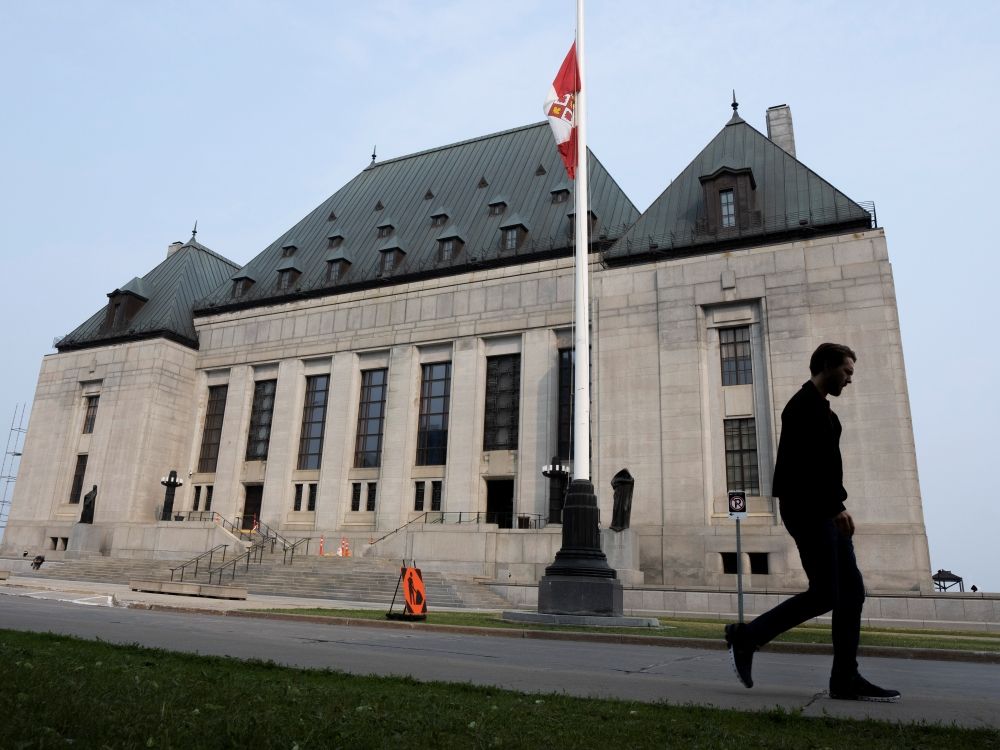- Reaction score
- 12,536
- Points
- 1,160
Turned this bit up during a hunt for some other stuff.
Chretien was adamant that the Supreme Court should play second fiddle to Parliament. In that spirit the "notwithstanding clause", sect 33, is not a nuclear option but merely asserts the normal give and take between Parliament and the Courts that has been the tradition in the Anglosphere at least since 1688. I would argue that the supremacy debate actually precedes 1688 and that 1688 merely crafted a lasting recognition of the supremacy of Parliament.

 en.wikipedia.org
en.wikipedia.org
Curiously, to me, while Trudeau deferred to the Roman Church throughout his studies, seeking official approval to study at Harvard and to read prohibited books like The Wealth of Nations, Chretien seems to have been a bit more of a radical. When he wanted to marry Aline in Maurice Duplessis's Union Nationale Quebec of 1957 the local priest refused to give him permission.
Le ciel est bleu. L'enfer est rouge. Heaven is bleu (Union Nationale). Hell is red (Liberal).
Chretien was adamant that the Supreme Court should play second fiddle to Parliament. In that spirit the "notwithstanding clause", sect 33, is not a nuclear option but merely asserts the normal give and take between Parliament and the Courts that has been the tradition in the Anglosphere at least since 1688. I would argue that the supremacy debate actually precedes 1688 and that 1688 merely crafted a lasting recognition of the supremacy of Parliament.
During the resulting First Ministers conference in November 1981, two of the premiers, Allan Blakeney of Saskatchewan and Sterling Lyon of Manitoba, made it clear that their principal objection to the proposed Canadian Charter of Rights and Freedoms was that it undermined the ancient British tradition of parliamentary supremacy.<a href="Jean Chrétien - Wikipedia"><span>[</span>54<span>]</span></a> Ever since the Glorious Revolution of 1688, the principle had always been that Parliament was the supreme lawmaking body in the land, and both Blakeney and Lyon were concerned that the Charter would give too much power to the courts.
Chrétien was the chief negotiator of what would be called the "Kitchen Accord," an agreement which led to the agreement of nine provinces to patriation. In the Kitchen Accord, Chrétien, along with Attorneys-General Roy McMurtry of Ontario and Roy Romanow of Saskatchewan, devised the compromise of Section 33, the so-called "notwithstanding clause," allowing Parliament and provincial legislatures to overrule the courts in Charter cases.<a href="Jean Chrétien - Wikipedia"><span>[</span>54<span>]</span></a> Chrétien remembered that Trudeau "hated" the idea of Section 33 and that he had to tell him: "Pierre, if you don't take the notwithstanding clause, you don't have the Charter."<a href="Jean Chrétien - Wikipedia"><span>[</span>54<span>]</span></a> Trudeau only accepted Section 33 when Ontario Premier Bill Davis, one of only two premiers supporting the federal government (Richard Hatfield of New Brunswick being the other), phoned him to say he would not support Trudeau in London if Trudeau did not accept Section 33, which Chrétien remembered changed Trudeau's attitude completely.<a href="Jean Chrétien - Wikipedia"><span>[</span>55<span>]</span></a> In a 2012 interview, Chrétien defended the controversial Section 33, saying: "Because some would argue that in a society the elected people have to be supreme — not judges — and I subscribe to that. Look at what happened in the United States where the judges reign according to their so-called philosophy. That is not the tradition here."<a href="Jean Chrétien - Wikipedia"><span>[</span>55<span>]</span></a> All of the English-speaking premiers accepted the compromise of Section 33, but Quebec Premier René Lévesque did not.

Jean Chrétien - Wikipedia
Curiously, to me, while Trudeau deferred to the Roman Church throughout his studies, seeking official approval to study at Harvard and to read prohibited books like The Wealth of Nations, Chretien seems to have been a bit more of a radical. When he wanted to marry Aline in Maurice Duplessis's Union Nationale Quebec of 1957 the local priest refused to give him permission.
Reflecting Chrétien's poor relations with the Catholic church, the local priest in Shawinigan, Father Auger, refused to marry Chrétien in his church, saying only bleus (blues, i.e. Union Nationale supporters) were welcome in his church and rouges (reds, i.e. Liberals) were not.<a href="Jean Chrétien - Wikipedia"><span>[</span>6<span>]</span></a>
Le ciel est bleu. L'enfer est rouge. Heaven is bleu (Union Nationale). Hell is red (Liberal).



